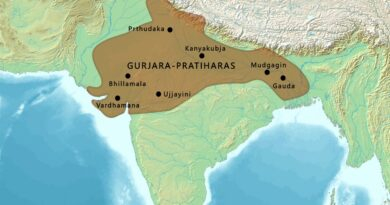Warren Hastings: First Governor General of Bengal and Pioneer of British India
Warren Hastings was chosen by the British East India Company to serve as Governor of Fort William in 1772. Following the Regulating Act of 1773, he was elevated to the position of Governor of Bengal and the first Governor General of Bengal. Hastings was a linguist, fluent in Bengali and Persian, and had an Orientalist perspective. He served as the British Resident in Murshidabad, the capital of Bengal, in 1758, where he was responsible for representing British interests to the Nawab.

Three major Acts passed in his tenure:
- The Regulating Act of 1773
- The Amending Act of 1781
- Pitt’s India Act 1784
Contents
Warren Hastings Contributions:
1. Reorganization of Administration: Hastings initiated significant reforms in the administrative structure of British India. He established a system of dual government, separating commercial and political functions. This laid the foundation for the British Raj’s administrative machinery.
- Dual system introduced by Robert Clive
- Warren Hastings also stopped the 26 lakhs payment made to the Mughal Emperor each year.
2. Regulation of East India Company Affairs: Hastings worked to stabilize the East India Company’s financial situation by regulating its affairs. He curbed corruption within the Company and streamlined its operations, ensuring better governance.
3. Judicial Reforms: Hastings introduced reforms in the judicial system, aiming for a more efficient and impartial administration of justice. He established the Sadar Nizamat Adalat and the Sadar Diwani Adalat, central courts of appeal, to oversee the judicial proceedings in Bengal.
Sadar Nizamat Adalat
| Sadar Diwani Adalat
|
Highest Appellate Criminal Court | Highest Civil Court of Appeal |
Indian Judge + Experts in Hindu and Muslim Laws (Judges and Members appointed by Governor in Council) | Presided by Governor and two Judges (From Council Members) |
- The Regulating Act of 1773 was passed, which established the Supreme Court of Calcutta and split the Supreme Court’s authority in Calcutta between the Government and that institution.
4. Expansion and Consolidation of British Territories: Hastings was instrumental in expanding and consolidating British territories in India. Through diplomatic negotiations and military campaigns, he annexed significant regions like Benares, Oudh, and parts of Mysore, thereby extending British influence.
- The Rohilla War (1774)
- The First Anglo-Maratha War (1775-82)
- The Second Anglo-Mysore War
5. Warfare and Diplomacy: Hastings skillfully navigated military conflicts and diplomatic negotiations during his tenure. Notable among these was the Rohilla War (1774) and the First Anglo-Maratha War (1775-1782). His diplomatic prowess allowed the East India Company to establish alliances with local rulers, enhancing British power in the subcontinent.
6. Cultural and Educational Patronage: Hastings patronized Indian arts, culture, and education. He supported the translation of Indian texts into English, fostering cross-cultural exchange. Hastings also founded the Calcutta Madrasa, an institution for the study of Muslim law and literature.
7. Trade Regulations: Hastings abolished the ‘dastak’ system, imposed a standard 2.5% tariff on all Indian and foreign goods, and regulated commerce to enhance the Company’s economic success.
- Abolished Dastak System
- Uniform Tariff of 2.5%
8. Other Contributions:
- Together with Sir William Jones, Warren Hastings founded the Asiatic Society of Bengal in 1784.
- In 1772, Calcutta was designated as Bengal’s capital.
9. Trial and Impeachment: Despite his contributions, Hastings faced scrutiny and trial upon his return to Britain. He was impeached by the British Parliament in 1787 on charges of corruption and maladministration during his time as Governor-General.
- Initiated Rohilla War
- Nanda Kumar Case
- Raja Chait Singh of Benaras Case
- Begums of Awadh Case
However, he was eventually acquitted in 1795, vindicating his reputation to some extent.
Criticisms of Warren Hastings Policies:
Warren Hastings’ tenure as the first Governor General of Bengal (1772-1785) was marked by significant contributions and reforms, but also by controversy and criticism. Hastings played a crucial role in consolidating British control over Bengal and laying the foundations for British India. However, his policies and actions were not without drawbacks and had significant effects on India.
His involvement in dubious acts to raise extra funds, two of which—the demand for a subsidy to the company from Chait Singh, the raja of Banaras, and the requisitioning of the treasures of the begums of Oudh (the mother and grandmother of the vizier)—were to count against him in his impeachment trial.
The establishment of the Supreme Court of Judicature at Fort William in Calcutta, based upon English law, was a significant step towards improving the legal system in Bengal. However, it also created a dual system of law, where English law was applied to British subjects and Indian law to Indian subjects. This dual system created a sense of inequality and discrimination against Indian subjects.
The abolition of the Dual System and the establishment of a Board of Revenue in Calcutta to collect the taxes, was a significant step towards improving revenue collection and reducing corruption. However, it also created a sense of alienation among Indian subjects, who felt that their traditional rights and privileges were being taken away from them.
Discover more from Simplified UPSC
Subscribe to get the latest posts sent to your email.


